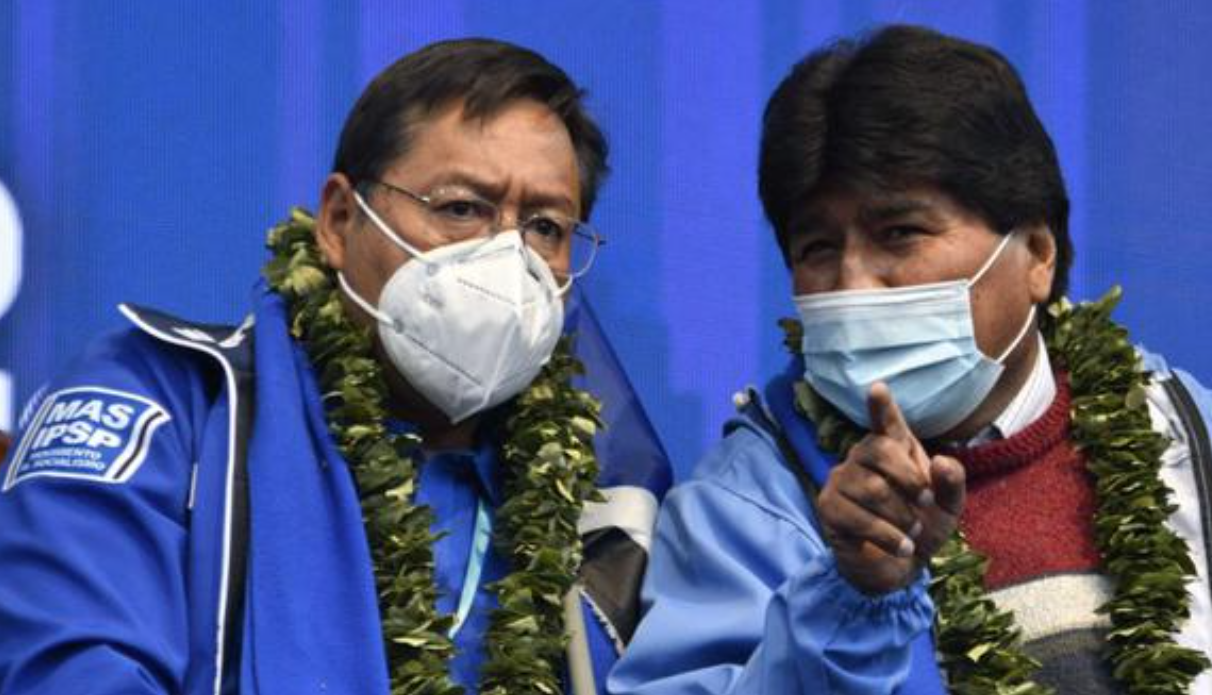Until 2019, Evo Morales only had enemies on the right of the ideological spectrum, whom he fought in the streets and at the polls, and whom he does not recognize as legitimate. However, since 2019, adversaries have emerged from his own base, MAS, whom he does recognize as legitimate because they are elected authorities, as is the case of the vice-president, David Choquehuanca. The root cause of this situation is his interest in running again for the presidency in 2025. For this reason, Morales is permanently dealing with internal adversaries or renovators, and external adversaries or enemies from the right wing, but with drug trafficking as a backdrop in his discursive agenda.
Internal adversaries: the renovators
Evo Morales and David Choquehuanca have shared for many years a common symbolic space, constituted by the MAS political party, the State, and social organizations. However, according to unofficial accounts, friction between both leaderships has been more evident in public opinion, since Morales returned to Bolivia in November 2020, after MAS has won again the general elections with Luis Arce.
David Choquehuanca has support in different parts of Bolivia, such as La Paz (natural stronghold), El Alto, northern Potosí, and in different regions of Santa Cruz, Beni, and Pando. Meanwhile, Evo continues to have total control over his historical social base: Chapare (Cochabamba).
The impulse given by Choquehuanca to the schools of leaders in different parts of the country, under the aegis of the discourse of renovation, is what makes Evo and his faction in the MAS uncomfortable. In the words of the vice-president: “The world has to renew itself. There is a global disorder. There is uncertainty, there is chaos. We need changes, a revolution of ideas. And who has to be the protagonists? Young people. They are the ones who have to awaken their creativity and not wait for seniors to tell them what to do”. On the other hand, for Evo Morales the renovators are the new “degeneration that works for a new political project”.
In view of these differences, in the last months, there have been arguments, pushing, and insults between followers of both leaders, such as what happened in Santa Cruz de la Sierra in June, which gives the impression of being in the middle of an electoral campaign.
Despite these frictions between the organizations supporting the vice-president and the former president, and the cross accusations on social networks and media, they took a picture together to show their “commitment to unity”. This occurred in a recent meeting between both leaders, in addition to President Arce, ministers of State, and representatives of social organizations.
External enemies: the right wing
Antagonism is a substantial element of Evo Morales’ political nature. After what happened in 2019 (the year in which irregularities were committed in the Electoral Tribunal to avoid the second round with Carlos Mesa, Morales resigned from the Presidency and fled to Mexico) and Jeanine Áñez constitutionally assumed the Presidency on a transitional basis. In this context, the former president has reached a paroxysm of discourse against everything that moves to his right. He dreams, eats, and plays soccer with the premise that what happened to him three years ago was a coup d’état carried out by his historical enemies.
This obsession that he permanently feeds with his speeches against political-partisan, social and civic opponents, influences the Judiciary to such an extent that he uses it to imprison, through the justification of coup d’état, the enemies of the right. The deprivation of liberty of Jeanine Áñez is an example of how it is possible to domesticate a counter-majoritarian power (judicial) to maintain the friend-enemy antagonism that translates into an intermittent political polarization that undermines the institutional bases of representative democracy.
With the sentencing of the former president to ten years in prison for breach of duties and resolutions contrary to the Political Constitution, the thesis of a coup d’état has been politically and ideologically strengthened. In fact, her opponents Carlos Mesa and Jorge “Tuto” Quiroga have been called “confessed coup plotters”. In the case of Luis Fernando Camacho, despite the fact that the social bases of MAS are calling for his imprisonment, he has not yet been prosecuted for the alleged coup.
Drug trafficking as a backdrop to Bolivian politics
In the context of an international soccer championship, called Evo’s Cup, to be held in the Chapare in August, parliamentary representatives of the political organization Comunidad Ciudadana (CC), led by Carlos Mesa, have objected to its convocation. In this way, they are trying to get the invited clubs to desist from participating on the grounds that Evo Morales is reproducing the same role as the Colombian Pablo Escobar (in the 1980s) in terms of a series of irregularities linked to drug trafficking.
From a historical perspective, drug trafficking and political-party politics (MIR, ADN, MNR) have had a subway intertwining that has left perennial marks in Bolivian society. A backdrop with which we have practically become accustomed to living.
2019, unforgettable; 2025, inscrutable
The verbal tussle between Evo and his renovating adversaries, on the one hand, and his enemies on the right, on the other, is almost normalized in the current political situation. With the former, the frictions are due to the hegemonic control of the MAS with respect to 2025. With the latter, their enmity is of historical-ideological origin and became more acute since 2019.
Only fate knows what will happen in 2025 with Evo and his adversaries at this juncture. The only certainty is that the events of 2019 will once again be exploited by Evo to victimize himself before his social bases with the idea that he was ousted by a coup maneuver.
Translated from Spanish by Janaína Ruviaro da Silva











